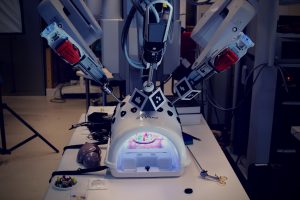Recent News
-

Taking AI from simulation into reality
CategoriesHopkins researchers introduce a new machine learning method that helps AI trained in simulated environments perform better in the real world.
-

AI’s stitch in time
CategoriesJohns Hopkins researchers successfully taught an AI simulation to close incisions by breaking the complicated suturing process down into simpler subtasks.
-

Supported by a Challenge Grant from the Johns Hopkins Institute for Assured Autonomy, a team led by Chien-Ming Huang is investigating the conceptual and technological advances required to enable artificial agents to act with prosocial intent.
-

Johns Hopkins researchers show that large language models can generate realistic patient data for training AI models without compromising individual privacy.
-

Vision envisioned
CategoriesBestowing machines with the ability to perceive the physical world as humans do has been a career-long mission of Alan Yuille, a pioneer in the field of computer vision.











